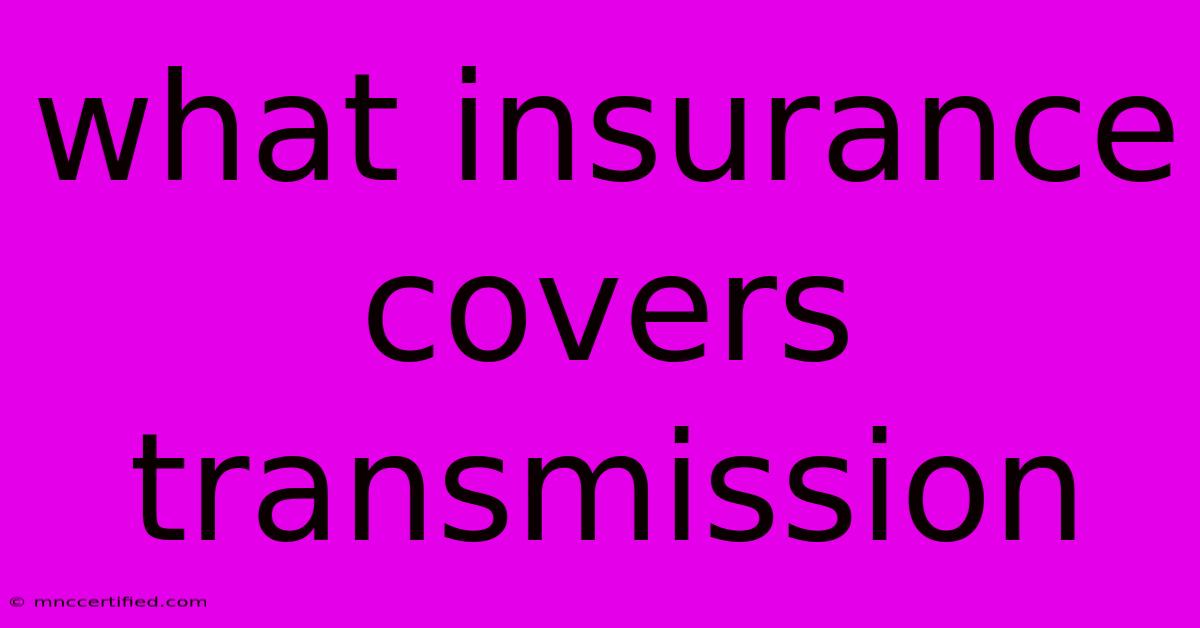What Insurance Covers Transmission

Table of Contents
What Insurance Covers Transmission Repair or Replacement?
Car trouble can strike at any time, and transmission problems are among the most expensive. Knowing what your insurance covers – and what it doesn't – is crucial to avoiding a costly surprise. This comprehensive guide breaks down transmission coverage, helping you understand your policy and plan accordingly.
Does Auto Insurance Typically Cover Transmission Repair?
Unfortunately, the simple answer is usually no. Standard auto insurance policies, like liability, collision, and comprehensive, typically don't cover transmission repairs or replacements unless the damage results from a covered incident. Let's clarify what that means:
Covered Incidents: When Your Insurance Might Pay
Your insurance might cover transmission repair or replacement if the damage is caused by:
- Collision: If you're involved in an accident where another vehicle hits your car, causing transmission damage, your collision coverage may pay for repairs or replacement. Important Note: Collision coverage typically has a deductible, meaning you'll pay a certain amount out-of-pocket before the insurance kicks in.
- Comprehensive Coverage: This covers damage from events other than collisions, such as:
- Vandalism: If someone intentionally damages your transmission.
- Fire: If a fire damages your transmission.
- Theft: If your car is stolen and the transmission is damaged.
- Natural disasters: Like hailstorms or floods that cause transmission failure.
Remember: Even in these cases, the insurance company will investigate to determine if the transmission damage was a direct result of the covered incident. If the damage is deemed pre-existing or unrelated, your claim might be denied.
Uncovered Situations: When You're Likely on Your Own
In most cases, transmission failure due to normal wear and tear is not covered by insurance. This includes:
- Mechanical failure: Parts wearing out over time (like worn-out clutches or seals).
- Fluid leaks: Unless caused by a covered event.
- Internal transmission issues: Developing gradually over time.
Understanding Your Policy: The Fine Print Matters
To know definitively what your insurance covers regarding transmission issues, you must thoroughly review your policy documents. Each insurer has its own terms and conditions, and coverage can vary significantly. Look for specific clauses related to:
- Exclusions: Carefully review the exclusions section to see what's not covered.
- Deductibles: Understand how much you'll need to pay out-of-pocket before your insurance starts to cover costs.
- Limits: Note the maximum amount your insurance will pay for repairs or a replacement transmission.
What About Extended Warranties?
An extended warranty might be a worthwhile investment to protect yourself against costly transmission repairs. These warranties often cover mechanical failures not covered by standard insurance policies. Carefully compare warranties from different providers to find the best coverage for your needs and budget.
Preventive Maintenance: Your Best Defense
The best way to avoid costly transmission repairs is through regular maintenance. This includes:
- Regular fluid changes: Following the manufacturer's recommended schedule.
- Professional inspections: Allowing a mechanic to detect potential problems early.
Conclusion: Know Your Coverage, Plan Accordingly
Dealing with a broken transmission is stressful and expensive. By understanding your insurance policy and taking proactive steps, like regular maintenance, you can be better prepared to handle this type of car trouble. Remember to always check the fine print of your policy and contact your insurer directly if you have questions or need clarification. Don't hesitate to seek multiple quotes to find the best coverage at the best price.

Thank you for visiting our website wich cover about What Insurance Covers Transmission. We hope the information provided has been useful to you. Feel free to contact us if you have any questions or need further assistance. See you next time and dont miss to bookmark.
Featured Posts
-
Todays Rugby England Vs South Africa Live
Nov 17, 2024
-
Airplane Insurance Cost Cessna 172
Nov 17, 2024
-
Josh Brolin Peter Dinklage Funny Scene
Nov 17, 2024
-
Ufc 309 Results Jones Vs Miocic Winner
Nov 17, 2024
-
Clemson Survives Pitt Final Score And Game Recap
Nov 17, 2024